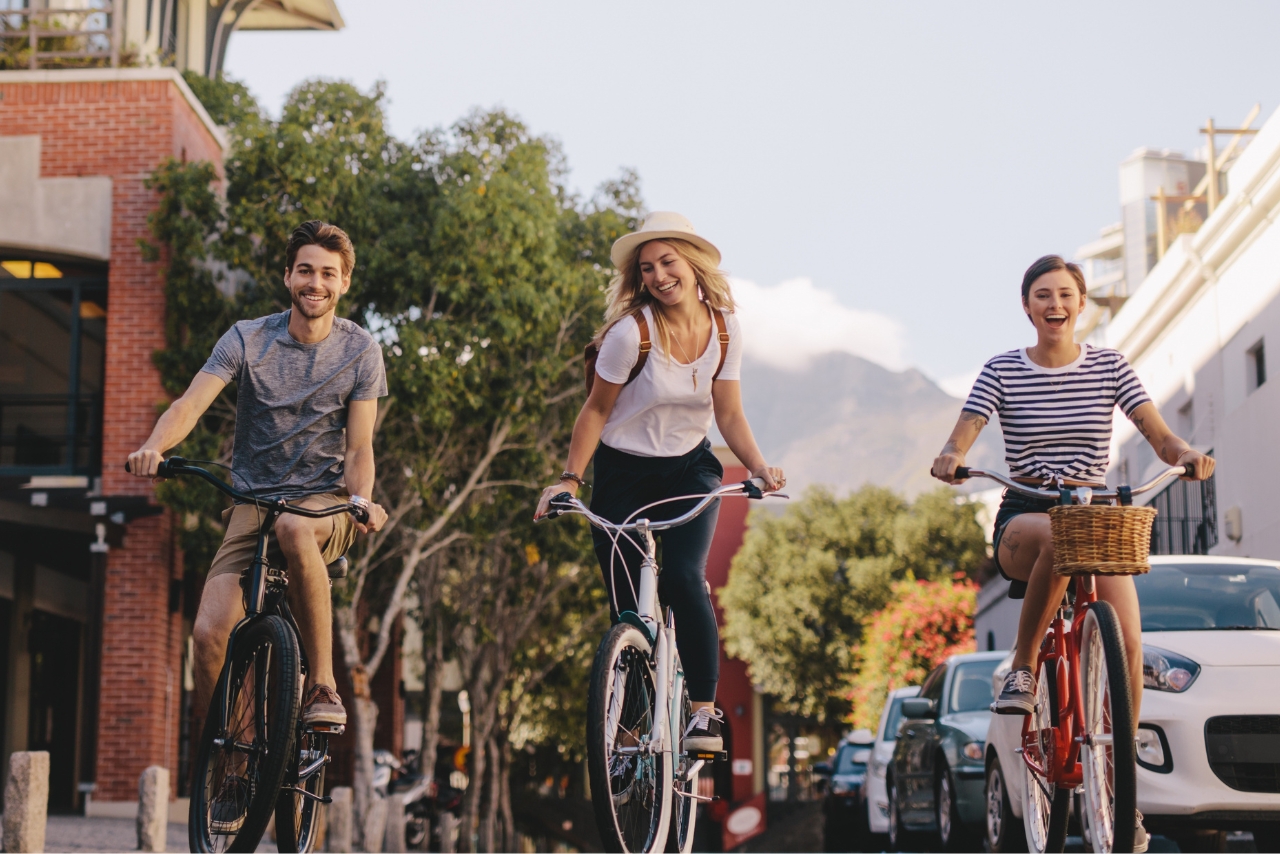Sustainable urban mobility can also mean living better, not sacrificing

“I look at the clock: 7:30. I feel anxious, it’s been a long time since I’ve felt this way. I love getting up early, listening to the birdsong in the garden and reading the book club story over a cup of tea. The anxiety doesn’t come from here, it comes from the past, when I glanced at the clock at 7.30 to start the morning rush, stressed and a quarter of an hour late for my eight o’clock class.
Every stop and change were a rattling minute in my head. Now I stop, take a deep breath and try to observe my thoughts. I’m in no hurry. My working hours are flexible, the community office is 11 minutes away by bike, I’ll take that now. I don’t go straight there, I stop at the local bakery for breakfast, I also stop at the school with the kids. It’s not in the way, just a few minutes’ detour.
I sit in the park outside the office, looking at the canopy of trees and planning my day. I start every day here, the office is 5 minutes away, but the whole city has become one big park. It’s September, 36 degrees of Celsius, more bearable under the shade of the trees. The morning cycle is part of my training plan, so I sometimes make detours, it’s good to get some exercise. I’ve never had a car, so if I want to go further, I can get anywhere by train. Well, not everywhere, but we are trying to improve. It’s part of my job. When our new project is finished, we can restore the old lines of other wonderful villages.
Next year I might even be able to take the train home at weekends. It’s a bit difficult to cycle 120 kilometres in the summer. And you can read on the train. I have a book club this week and I’ve got 100 pages to read. It’s a kind of inner journey. Now I don’t just have to get somewhere, I can travel and really arrive. After 25 years”.
What will our future look like in 2050? We ask this question a lot, even though it is a challenge to accurately predict changes in ecological and social systems even on a small timescale. Furthermore, the future is not set in stone, we are shaping it ourselves. That’s why, from the autumn semester onwards, we will start each month’s sustainability theme with a short vision, envisioning the future we want to create on campus and beyond. These positive visions can also help us to counter the depressing news of the climate and ecological crisis with utopias that can help us move beyond paralysis and towards action for a more hopeful future.
The first essay envisioned a 15-minute city. The concept is about getting to work, school and other services within 15 minutes of the city, including sustainable transport alternatives.
In contrast to the vision of a 15-minute city, current urban structures have significant transport needs for residents, which in most cases result in significant greenhouse gas emissions, contributing to global warming. Around a fifth of global carbon emissions are transport-related, with almost half of this coming from passenger road transport, i.e. journeys by cars and buses. This accounts for closely 9.5% of total CO2 emissions. In addition, urban road transport also pollutes the air, leading to respiratory diseases, noise, congestion, traffic jams and the need for parking space.
The European Car-Free Day on 22 September each year draws attention to these problems. The aim of the program is to highlight the environmental, safety and urban problems caused by increased car use and to encourage responsible transport choices, the benefits of sustainable, environmentally and people-friendly urban transport and the need to improve public transport, cycling, and walking.
We can do something in our everyday lives to change these numbers. To wrap up this article, we have also included some challenges on the subject, which we have collected with the help of students from the Sustainable Ethical Marketing course. The students learned about sustainable marketing and how to organize sustainability campaigns in a full-day project week course, and in the second half of the day they helped to develop the Theme of the Month project to engage students more deeply with their ideas. We will report on this in more detail soon.
The September challenges:
- Ride your bike to the campus at least once a month.
- If you want a bigger challenge, ride your bike at least once a week.
- If you’ve been driving in Budapest, try out public transport for a day or two.
- Walk on weekdays if you only have to make 1-2 stops.
- Use the stairs instead of the elevators in university buildings.
- Every weekend, walk for at least an hour in a green environment, for example in the Buda Hills in Budapest.
- Look around to see what services (e.g., grocery store, hairdresser, cinema, café) are available in your neighborhood. If you can, choose to walk to these rather than making a longer journey.
- Try for a week to choose electric instead of fossil-fueled transport vehicles when you can (e.g., a tram or electrified train instead of a bus, a car-sharing service with an electric car instead of your own car).
- If you can, don’t take the car at all for a week!
- Check your phone to see how many steps you take on a typical day. For a week, try to do more each day than you did at the same time in the previous week.
How many challenges will you complete in September?
In May 2024, we relaunched the Sustainability Topic of the Month project, with the aim of presenting an interesting and relevant topic at Corvinus every month. In September, we have chosen sustainable urban transport as our theme, and we welcome related events, activities and results at mate.kovacs2@uni-corvinus.hu.